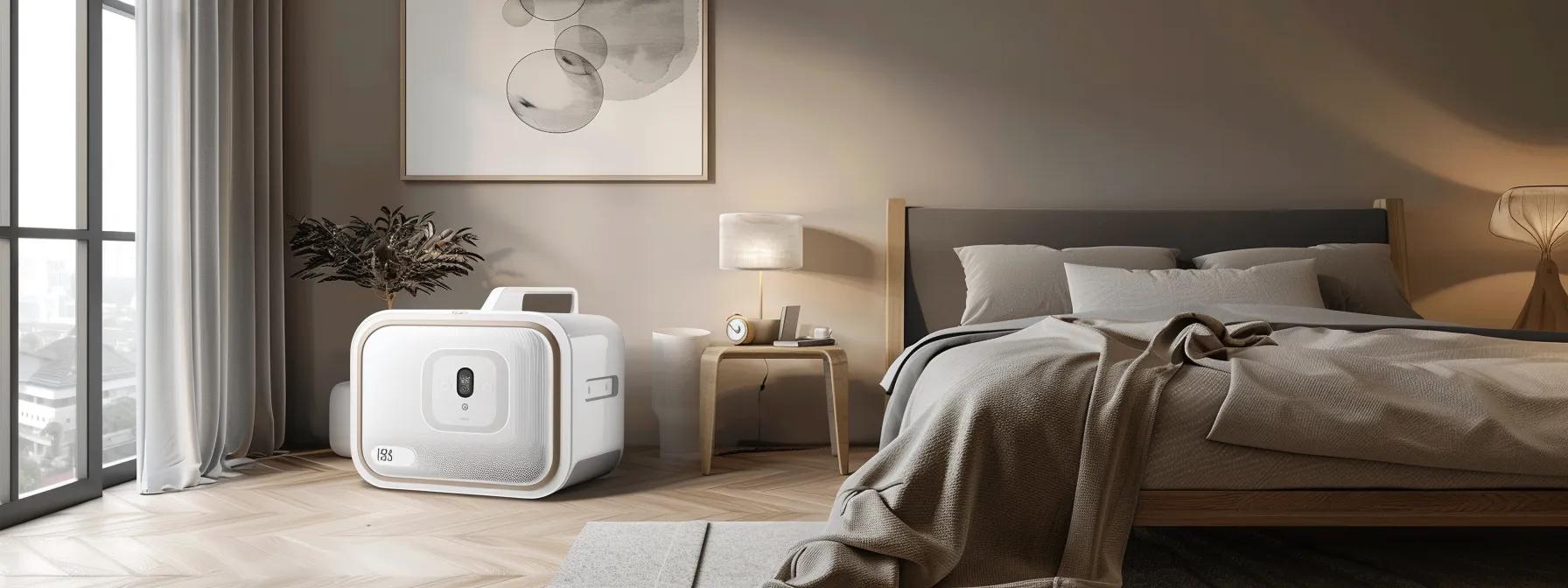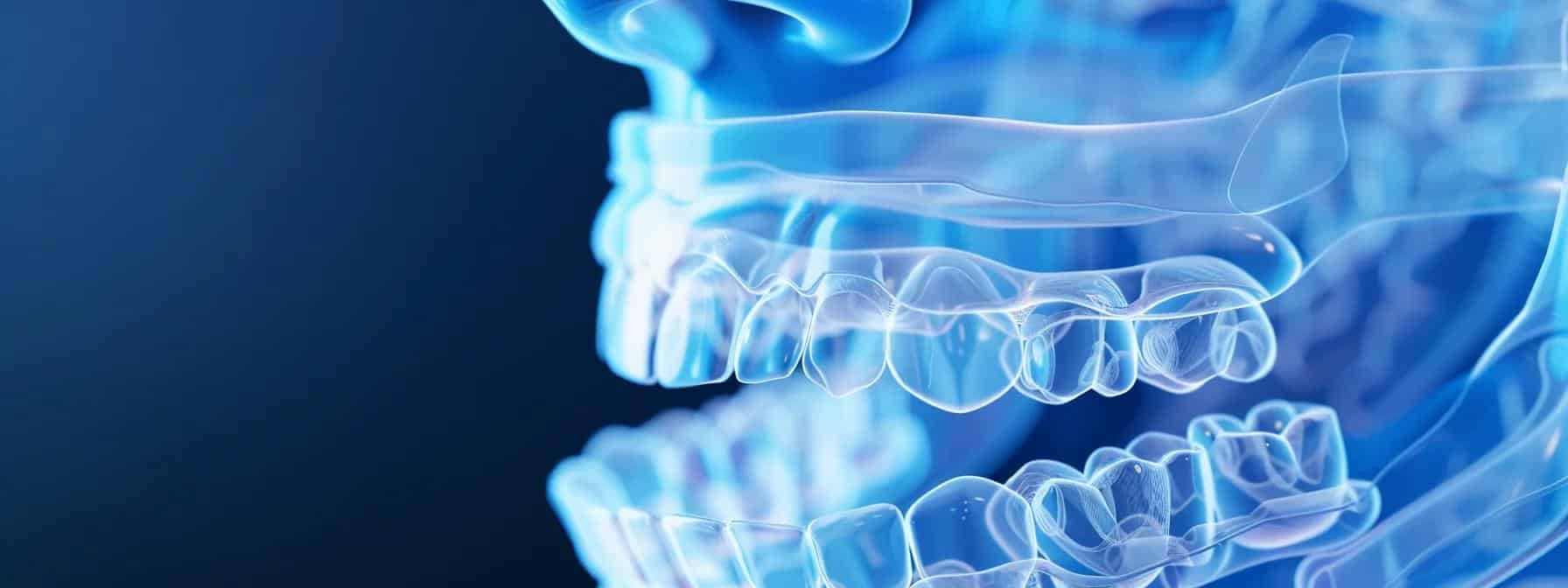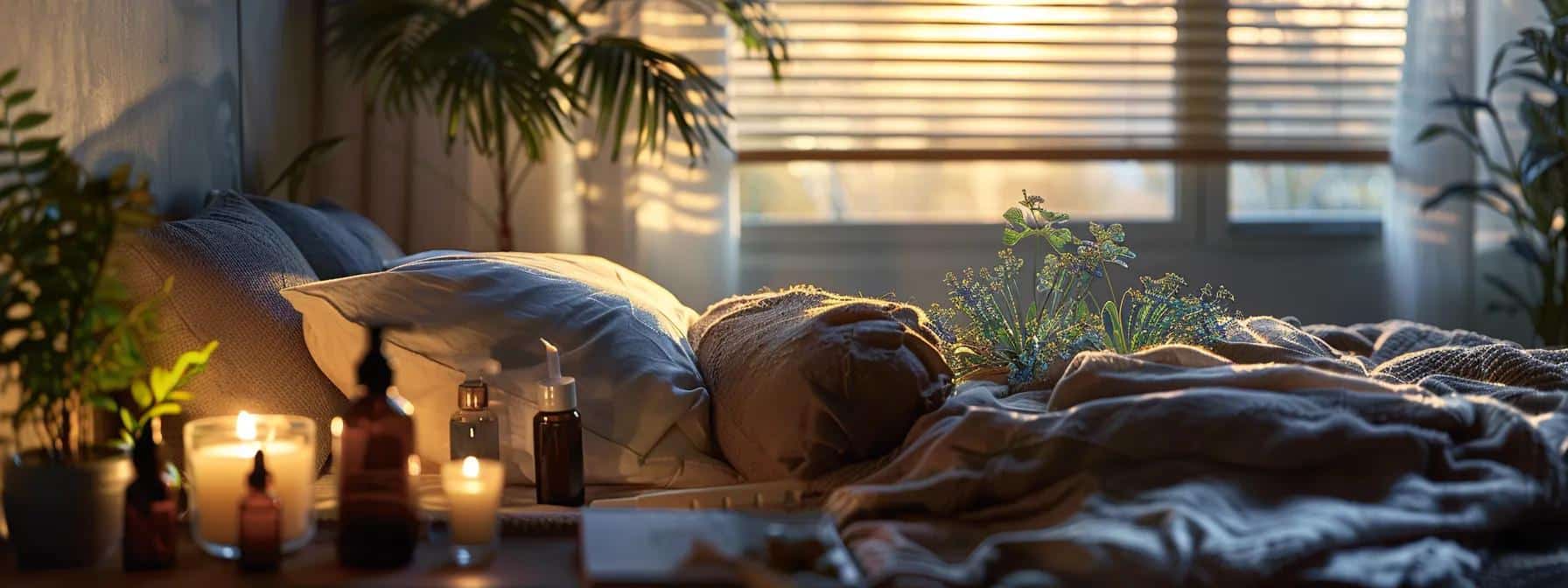Many people with sleep apnea struggle with the discomfort of CPAP machines. Fortunately, there are effective CPAP alternatives that can help manage this condition. This article will explore natural remedies, lifestyle adjustments, and the use of oral appliances as solutions for enhancing sleep quality. Readers will gain practical insights into how aerobic exercise and nasal sprays can improve oxygen saturation and overall breathing. By addressing these pain points, individuals can find relief and improve their sleep without relying solely on CPAP devices.

Understanding Effective Natural Alternatives to CPAP for Sleep Apnea
Sleep apnea is categorized mainly into obstructive, central, and complex forms, each with unique characteristics. Exploring CPAP alternatives particularly due to issues like nasal congestion, can lead to more comfortable and effective management strategies. This section will cover practical approaches involving the hypoglossal nerve stimulation, palate modifications, and lifestyle changes aimed at improving sleep quality.
Overview of Sleep Apnea Types
Sleep apnea is primarily categorized into three types: obstructive, central, and complex. Obstructive sleep apnea (OSA) occurs when throat muscles relax excessively during sleep, blocking the airway and leading to disrupted breathing. Central sleep apnea, on the other hand, results from a failure of the brain to signal the muscles to breathe, while complex sleep apnea syndrome combines features of both obstructive and central sleep apnea. Understanding these differences is crucial for identifying effective management strategies, including natural alternatives to CPAP that address specific symptoms associated with the disease.
Factors such as weight and nasal obstruction can significantly influence the severity of sleep apnea. For instance, individuals with excess weight may find that losing weight can alleviate some symptoms, while using methods like meditation can help manage stress, further improving sleep quality. Additionally, dental health issues like tooth decay may also impact breathing during sleep, making it important to maintain proper oral hygiene. Recognizing these interconnections assists individuals in pursuing comprehensive treatment plans beyond traditional CPAP use.
Importance of Exploring Alternatives
Exploring alternatives to CPAP for sleep apnea is vital for many individuals who face challenges with conventional treatment methods. Research indicates that natural options can enhance sleep hygiene and improve mood, providing a more holistic approach to managing the condition. Physicians often recommend integrating lifestyle changes, such as weight management and the use of a wedge pillow, which can facilitate better airflow and promote restful sleep.
By considering these effective alternatives, individuals can take proactive steps toward alleviating their symptoms and improving overall well-being. Solutions like hypoglossal nerve stimulation and engaging in stress-reduction techniques show promise in achieving better sleep results. These innovative approaches empower patients to work closely with their healthcare providers and tailor treatment plans that cater to their unique situations, ultimately leading to improved sleep quality and a healthier lifestyle.
Natural Remedies for Sleep Apnea
Weight management techniques play a crucial role in addressing sleep apnea symptoms. Specific exercises, including throat and airway strengthening, can enhance breathing. Herbal remedies, such as honey, may provide additional support, while acupuncture has emerged as a promising option for improving sleep quality. Each of these natural remedies offers practical insights for individuals seeking effective alternatives to CPAP.
Weight Management Techniques
Weight management techniques are essential for individuals seeking natural alternatives to CPAP in managing sleep apnea. Maintaining a balanced diet that emphasizes proper nutrition can aid in reducing excess weight, which is a significant factor in sleep apnea severity. Research shows that losing even a small percentage of body weight can alleviate symptoms and lower associated risks such as hypertension, promoting overall well-being and enhancing sleep quality.
Engaging in regular physical activity is another crucial aspect of effective weight management that can significantly improve symptoms of sleep apnea. Activities like cardio exercises not only support weight loss but also increase lung capacity, enhancing breathing patterns during sleep. Additionally, incorporating practices such as acupuncture may provide further benefits by promoting relaxation and reducing stress, factors that contribute to better sleep and overall health.
The Role of Specific Exercises
Specific exercises targeting the neck and throat can play a significant role in managing sleep apnea symptoms. Strengthening these areas may help reduce airway obstruction, which is a common risk factor for individuals suffering from obstructive sleep apnea. Physical examination conducted by a healthcare provider can help identify the most effective exercises tailored to an individual’s needs, leading to improved breathing patterns and sleep quality.
Incorporating regular physical activity, including focused stretching and resistance exercises, can enhance overall respiratory function. These exercises may not only support weight management efforts but also improve airflow, reducing reliance on machines such as CPAP. For individuals exploring alternatives to conventional treatment, these practical exercises provide an effective, natural strategy to alleviate symptoms and promote restful sleep.
Benefits of Throat and Airway Exercises
Throat and airway exercises can significantly benefit individuals with sleep apnea by improving lung function and reducing airway obstruction. A systematic review of various studies highlights that these exercises strengthen the muscles of the jaw and throat, leading to better control over the airway during sleep. By targeting specific areas, individuals can experience enhanced breathing patterns, which may reduce the need for a CPAP mask and provide a natural alternative for managing their condition.
Furthermore, these exercises play a crucial role in engaging the central nervous system to promote relaxation and improve overall sleep quality. Incorporating practices such as throat strengthening and jaw alignment techniques can directly influence the severity of obstructive sleep apnea symptoms. As individuals notice positive changes, they may feel more empowered to adopt these practical solutions, significantly enhancing their nighttime breathing and contributing to a healthier lifestyle.
Impact of Honey and Herbal Remedies
Honey has been recognized for its potential benefits in managing sleep apnea symptoms, particularly in reducing fatigue associated with disrupted sleep. Studies suggest that honey can promote relaxation and improve tissue health, which may have a positive influence on overall sleep quality. For example, incorporating honey into a warm beverage before bedtime can create a soothing ritual that enhances relaxation and potentially aids in better sleep.
Herbal remedies, including valerian root and chamomile, are widely regarded for their calming properties, which can help alleviate the stress and anxiety often linked to sleep apnea. These natural options can contribute to maintaining healthy blood pressure levels, ultimately benefiting individuals struggling with sleep-related breathing issues. Additionally, practices that involve breathing exercises similar to those used to play wind instruments can further engage the nerves associated with respiratory function, promoting a more restful night.
Acupuncture and Its Efficacy
Acupuncture has emerged as a promising natural remedy for sleep apnea, particularly for individuals dealing with mouth breathing, snoring, and headaches that often accompany disordered sleep. This ancient practice involves stimulating specific points on the body, which may help reduce airway inflammation and improve relaxation, making it easier for individuals to breathe during sleep. Research indicates that acupuncture can aid in alleviating some symptoms of sleep apnea, offering a holistic approach to managing the condition.
Additionally, acupuncture may be particularly beneficial for those experiencing sleep disturbances related to menopause. Many women find that hormonal changes can exacerbate sleep apnea symptoms or lead to increased snoring. By integrating acupuncture into their wellness routine, they might experience improved sleep quality, allowing for better rest and reduced reliance on devices like CPAP. Combining acupuncture with other lifestyle adjustments, such as choosing supportive pillows, can further enhance the overall effectiveness of natural sleep apnea management strategies.

Lifestyle Adjustments to Enhance Sleep Quality
Creating an optimal sleep environment is essential for enhancing sleep quality in individuals managing sleep apnea. This includes regulating room temperature and utilizing hydration and humidification strategies. Dietary changes can promote relaxation, while maintaining consistency in sleep patterns is vital for supporting the nervous system. Additionally, techniques for reducing alcohol and tobacco use can further improve nighttime breathing, offering practical insights for better management of sleep apnea.
Optimal Sleep Environment and Temperature
Creating an optimal sleep environment is a key aspect of managing sleep apnea naturally. Regulating the room temperature can significantly impact sleep quality; cooler temperatures often promote better rest. Utilizing alternative medicine practices, such as nasal irrigation, can also help clear airways, making it easier to breathe, especially for those who struggle with nasal congestion while sleeping. Proper hydration levels are crucial as well, enabling the throat muscles to remain relaxed and preventing airway blockage during the night.
Another critical factor is maintaining a consistent sleep routine. This involves going to bed and waking up at the same times each day, which supports the body’s internal clock and enhances overall sleep quality. It can be beneficial to assess dietary choices before bedtime to avoid discomfort in the stomach that might disrupt sleep. Individuals who practice therapy techniques, including relaxation methods and gentle stretches, may find improvements in their breathing patterns throughout the night, reducing the need for CPAP while enhancing their overall well-being.
Hydration and Humidification Strategies
Hydration plays a crucial role in optimizing airflow during sleep, particularly for individuals managing sleep apnea. Staying well-hydrated helps keep the throat muscles relaxed, reducing the chances of airway blockage and facilitating better breathing. Health care providers often recommend drinking sufficient water throughout the day, while also considering the time of consumption to avoid nighttime disruptions caused by frequent bathroom visits. Incorporating herbal teas or warm beverages before bedtime can enhance relaxation without the stimulants found in caffeinated drinks, further contributing to improved sleep quality.
Humidification strategies can greatly enhance the sleep environment for those with sleep apnea. Using a humidifier in the bedroom helps maintain moisture in the air, which can ease breathing difficulties related to dry air, particularly for those who breathe through the mouth at night. By keeping the throat and nasal passages moist, individuals may experience less discomfort, facilitating better airflow and minimizing the need for more invasive treatments. Those with underlying conditions, such as heart failure, should consult their health care providers to ensure that humidification strategies fit within their overall health plans.
Dietary Changes for Better Sleep
Dietary changes can significantly impact sleep quality for individuals managing sleep apnea. Research suggests that diets high in anti-inflammatory foods and low in refined sugars can reduce inflammation, which is known to contribute to airway obstruction. Incorporating foods rich in omega-3 fatty acids, such as fish and walnuts, may lower the risk of sleep apnea symptoms, thus helping to regulate blood pressure and improve overall health status.
In addition, maintaining regular meal times and ensuring the last meal is a few hours before bedtime can enhance sleep patterns. Foods containing tryptophan, like turkey and bananas, can promote relaxation and improve sleep quality. By collaborating with health care providers to tailor dietary plans, individuals can address specific concerns related to sleep apnea and create environments that support restful nights.
The Importance of Sleep Consistency
Sleep consistency plays a vital role in managing sleep apnea, as maintaining a regular schedule can significantly enhance sleep quality and overall well-being for patients. The body’s internal clock benefits from going to bed and waking up at the same time each day, promoting better rest and reducing the likelihood of experiencing disruptions associated with allergies and other environmental factors. If individuals are proactive about sleep routines, they may find themselves less reliant on interventions like surgery or devices suggested by the Food and Drug Administration.
Utilizing tools such as a mobile app to track sleep patterns can aid patients in establishing and maintaining sleep consistency. By setting reminders for bedtime and monitoring sleep quality, individuals can identify factors affecting their rest, whether they are dietary choices or external triggers. This structured approach fosters a deeper understanding of personal sleep needs, encouraging effective natural alternatives that complement their journey toward improved health and quality of life.
Techniques for Reducing Alcohol and Tobacco Use
Reducing alcohol and tobacco use can significantly improve sleep quality for individuals managing sleep apnea. Both substances can lead to respiratory complications that exacerbate sleep disorders. Techniques such as diaphragmatic breathing can encourage relaxation and reduce cravings, promoting healthier habits. By focusing on breathing through the nostrils and maintaining good sleep hygiene, individuals may find themselves sleeping more soundly, ultimately reducing their dependence on machines like CPAP.
One effective strategy involves utilizing a tennis ball placed in the back of a shirt to discourage back sleeping, which may help reduce the urge to smoke or drink alcohol during the night. This simple method fosters better sleeping positions that align the airway, lessening the impact of alcohol consumption on breathing patterns. By actively addressing these habits, individuals can take proactive steps toward enhancing their overall sleep experience and well-being.

how can you cure sleep apnea naturally?can sleep apnea be cured naturally?how do i get rid of sleep apnea without cpap?what are natural remedies for sleep apnea?
Oral Appliances as an Alternative
Oral appliances serve as effective alternatives for managing sleep apnea by utilizing various designs to optimize airway alignment and enhance breathing during sleep. This section will cover different types of oral appliances, how they function to improve sleep quality, and their benefits and drawbacks compared to CPAP. Emphasizing the role of muscle relaxation, cosmetic dentistry approaches, and the impact of lifestyle choices—such as maintaining a healthy diet—will offer valuable insights for those seeking practical solutions.
Overview of Different Types Available
Oral appliances designed for managing sleep apnea come in various types, each geared toward optimizing airway alignment and enhancing breathing during sleep. Many of these devices, such as mandibular advancement appliances, work by gently repositioning the jaw and soft palate, reducing airway obstructions that contribute to sleep apnea symptoms. Insights from institutions like the Mayo Clinic suggest that these appliances can provide a viable alternative for individuals seeking solutions without the discomfort of CPAP machines, especially when lifestyle factors such as physical activity and weight management are also addressed.
These oral appliances cater to different needs and preferences, making them suitable for various patients, including those with sleep apnea linked to type 2 diabetes. By focusing on factors like jaw alignment and airway clearance, these devices support overall respiratory health while potentially alleviating issues that can arise from disrupted sleep. Collaborating with professionals in pulmonology, individuals can determine the most effective oral appliance tailored to their specific conditions, paving the way for restful nights and improving overall well-being.
How They Work to Improve Sleep Apnea
Oral appliances effectively manage sleep apnea by promoting optimal airway alignment, which helps to reduce airway obstruction during sleep. These devices work by gently repositioning the jaw and soft palate, allowing for improved airflow and enhanced oxygen intake. For individuals sensitive to allergens, using a humidifier in conjunction with these appliances can further alleviate discomfort, making breathing easier at night.
In addition to physical positioning, oral appliances can assist in minimizing the impact of environmental factors that contribute to sleep disruption. For example, using antihistamines before bedtime may complement the benefits of oral devices by reducing allergy-related swelling in the nasal passages, thereby improving overall sleep quality. This combined approach addresses both mechanical and environmental elements, providing a comprehensive strategy for individuals seeking effective alternatives to CPAP treatment.
Benefits and Drawbacks Compared to CPAP
Oral appliances offer several advantages compared to CPAP machines, particularly in flexibility and comfort. Many individuals find that these devices are less intrusive and easier to use, potentially enhancing their overall quality of life. Unlike CPAP, which may cause irritation and discomfort from prolonged usage, oral appliances can be customized to fit individual needs, making them an appealing option for people seeking alternatives that integrate with their lifestyle while managing sleep apnea symptoms effectively.
On the other hand, oral appliances may not provide the same level of effectiveness as CPAP for all patients, especially those with severe sleep apnea. Some individuals may experience stress or anxiety about the fit or adjustability of these devices, leading to decreased compliance. Furthermore, while oral appliances can mitigate symptoms, they may still require complementary approaches, such as medication or lifestyle changes, to achieve optimal results and improve overall sleep quality.
Integrating Mind-Body Practices
Incorporating mind-body practices can significantly improve sleep quality for individuals managing sleep apnea. Yoga promotes relaxation and flexibility, which may alleviate symptoms and reduce the risk of choking during the night. Breathing exercises enhance respiratory function, and meditation techniques facilitate deeper sleep by addressing sleep deprivation concerns. Each of these practices offers practical insights for enhancing bedtime routines.
Yoga and Its Role in Sleep Improvement
Yoga serves as a beneficial practice for individuals managing sleep apnea, offering various natural remedies for sleep apnea that promote relaxation and enhance breathing. The incorporation of specific yoga poses can improve lung capacity and strengthen respiratory muscles, leading to better airflow during sleep. Research indicates that regular practice may reduce heart rate and activate the body’s relaxation response, creating a calming environment that supports restful nights.
In addition to physical benefits, yoga also emphasizes mindfulness and stress reduction, which are essential for improving sleep quality. Techniques such as deep breathing and meditation integrated within yoga sessions help individuals manage anxiety, a common contributor to sleep disturbances. By incorporating yoga into their routine, individuals can actively engage in a holistic approach to managing sleep apnea, finding relief and improving their overall well-being.
Breathing Exercises to Alleviate Symptoms
Breathing exercises can play a significant role in alleviating symptoms of sleep apnea by enhancing respiratory function and promoting relaxation. Techniques such as diaphragmatic breathing encourage deeper inhalations and exhalations, which help strengthen the lungs and improve oxygen intake during sleep. By incorporating these exercises into daily routines, individuals may experience better airflow at night, reducing the severity of sleep disturbances.
In addition to strengthening respiratory muscles, practicing controlled breathing techniques helps reduce stress and anxiety levels, which are common contributors to sleep apnea. Individuals can benefit from setting aside a few minutes each day for mindful breathing exercises, creating a calming environment that supports overall well-being. Over time, these practices can lead to improved sleep quality, offering a valuable natural alternative to CPAP for managing sleep apnea symptoms effectively.
Meditation Techniques for Better Sleep
Meditation techniques provide valuable tools for individuals managing sleep apnea, promoting relaxation and reducing anxiety, which can contribute to better sleep quality. By practicing mindfulness or guided meditation regularly, individuals can create a calming pre-sleep routine that prepares the mind and body for rest. Incorporating simple breathing exercises during meditation can deepen relaxation, enhance oxygen flow, and help alleviate some symptoms of sleep apnea.
Resources for Further Support and Solutions
Connecting with sleep apnea support groups can provide individuals valuable resources and shared experiences in managing their condition. Recognizing when to seek professional help is crucial for those whose symptoms may not respond to natural alternatives. Additionally, educational materials and workshops are available to further inform individuals about effective strategies for sleep apnea management, enhancing their overall understanding and approach to treatment.
Connecting With Sleep Apnea Support Groups
Connecting with sleep apnea support groups can provide vital resources for individuals seeking effective natural alternatives to CPAP. These groups offer shared experiences and insights that can help members navigate their sleep apnea journeys. Participants often discuss various strategies, including lifestyle modifications and holistic remedies, which may enhance their sleep quality and overall well-being.
Support groups also serve as a platform for individuals to ask questions and gain feedback from others facing similar challenges. This collaborative environment fosters a sense of community that can alleviate feelings of isolation commonly experienced with sleep disorders. By engaging with support groups, individuals can access valuable information and emotional support that empowers them to take control of their sleep health effectively.
Recognizing When to Seek Professional Help
Recognizing when to seek professional help for sleep apnea is crucial for individuals who may not experience improvement through natural alternatives. Symptoms such as persistent daytime fatigue, loud snoring, or periods of halted breathing during sleep signal a need for evaluation by a healthcare provider. Timely intervention can lead to a comprehensive assessment, ensuring that appropriate treatment options are explored, including both traditional and innovative approaches.
Individuals experiencing significant disruptions in their nightly rest or ongoing health issues that may be related to sleep apnea should consult a professional. Engaging with healthcare experts can provide valuable insights into individualized treatment plans, which may incorporate lifestyle changes, oral appliances, or more advanced therapies. By taking proactive steps, individuals can effectively manage their condition and enhance their overall well-being, paving the way for healthier sleep.
Educational Materials and Workshops Available
Various educational materials and workshops are available for individuals seeking effective natural alternatives to CPAP for managing sleep apnea. These resources often cover topics related to lifestyle changes, dietary modifications, and specific exercises that can enhance breathing during sleep. Engaging with these materials allows individuals to gain knowledge and practical insights necessary for improving their sleep quality while addressing sleep apnea symptoms.
Workshops led by professionals in sleep health can provide hands-on experience and foster a supportive environment for participants. Individuals can learn about the benefits of exercises, weight management practices, and holistic approaches like yoga and meditation. By actively participating in these programs, individuals not only enhance their understanding of sleep apnea but also receive guidance tailored to their unique needs, empowering them to take control of their health journey.
Vivos : The Natural Path to Better Rest
Tired of wrestling with your CPAP machine every night? A groundbreaking dental approach could transform your sleep experience without the need for bulky equipment.
The innovative DNA appliance therapy works with your body’s natural processes to address sleep apnea at its source. By gently remodeling the oral and facial structures, this treatment helps create lasting improvements in airway architecture through specialized orthodontic techniques.
What makes this solution stand out:
- Freedom from traditional devices: Break free from nightly equipment setup and maintenance while achieving better sleep quality through gradual anatomical enhancement.
- Biological transformation: Rather than just managing symptoms, this approach stimulates your body’s adaptive capabilities to develop optimal breathing pathways.
- Time-defined wellness journey: Experience progressive improvements over a tailored treatment period, typically spanning 12-24 months, leading to sustained results.
- Peaceful nights: Eliminate the constant hum of machinery that disturbs both you and your partner.
The treatment utilizes a precisely engineered oral device that works while you sleep. Through gentle biomechanical forces, it encourages natural development of your jaw structure and expands breathing capacity, helping many patients achieve substantial improvements in both sleep quality and daily energy levels.
Ready to revolutionize your approach to sleep apnea? Discover how this innovative dental solution could offer a permanent path to better breathing—without lifetime dependence on machines. Contact Dr. Azuma today to learn if this transformative treatment aligns with your wellness goals.
Conclusion
Effective natural alternatives to CPAP for managing sleep apnea play a crucial role in improving sleep quality and overall well-being. By exploring options like weight management, throat exercises, and herbal remedies, individuals can discover practical strategies to alleviate their symptoms. Additionally, integrating mind-body practices, such as yoga and meditation, can enhance relaxation and respiratory function, leading to a more satisfactory sleep experience. Empowering individuals to take control of their health through these alternatives not only addresses the challenges of sleep apnea but also fosters a healthier lifestyle overall.
Dreaming of Better Sleep?
At Azuma Dental in Honolulu, HI, Dr. Eugene Azuma understands the importance of a confident, peaceful sleep.
Your search for genuine dental care shouldn’t feel like an endless quest through clinics that treat you like just another appointment slot. When dealing with concerns like sleep apnea or dental anxiety, you deserve a practice that takes the time to truly understand your needs.
Our team believes in building real connections with every patient who walks through our doors. Whether you’re seeking relief from sleep apnea or addressing routine dental concerns, we ensure you feel heard and valued, creating treatment plans that align with your unique health goals and comfort level.
Here’s what they do differently:
- Personalize your consultation to get to know you.
- Clearly explain all treatment plans and options.
- Ensure your comfort and care throughout all procedures.
Don’t wait—schedule a consultation today for your CPAP alternative!
Meanwhile, visit our website to learn more about our sleep apnea treatments. It’s time to move beyond feeling like just another patient. With Dr. Eugene Azuma, feel confident, informed, and thrilled about your smile and health!
Schedule your free consultation today and breathe better!




